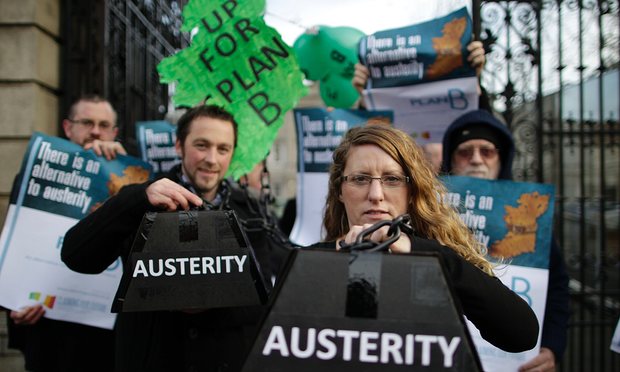
Irish election results show that austerity measures, even when resulting in economic recovery, will be punished by electorates.
The results are in. In the first general election since 2011, the previous coalition government of Fine Gael (centre-right) and Labour, has been rejected by the Irish people. This time around Fine Gael and Labour, despite an uptake in the economy, suffered unprecedented losses, and the main opposition parties Fianna Fáil (centre-right) and Sinn Fein (left) both gained a number of extra seats, as well as an increased number of disparate independent candidates. Without a doubt, on a national level this election has been seen as a huge blow to Fine Gael and a direct consequence of the unpopular austerity measures imposed on the Irish people.
Thus, since last Friday, two things have been undeniably changed: firstly, the Irish political landscape and secondly, claims that austerity measures, even when they bring economic stability, can be popular amongst an electorate. While at the EU level, Ireland may be seen as the star pupil amongst the P.I.G.S., closer to home, voters either aren’t feeling the recovery or are embittered with how the austerity measures were imposed. Indeed, at the EU level, the result represents the recurring theme, witnessed recently in Portugal and Spain, of centre-right austerity imposing government’s being rejected in recent general elections.
Ireland: the star pupil?
Among the P.I.G.S. (Portugal, Ireland, Greece, Spain, the EU members that received rescue packages from the EU following the economic downturn in 2008) Ireland has been touted as the poster child for recovery; the country that has bounced back from the depths of economic crisis unlike any of the others. Accepted by the then Fianna Fail government, and implemented by Fine Gael and Labour when they were elected in 2011, the package was seen as necessary in order to protect against a destroyed real estate sector, unprecedented levels of unemployment, increased taxes, excessive household debt and mass emigration of the country’s youth. The Irish people, fresh out of a period of economic prosperity referred to as the “Celtic Tiger” years, were hit hard.
Of course, there was push back. The rescue package offered by the EU and the IMF was deemed excessively harsh by a huge proportion of the Irish people. The last number of years has seen numerous anti-austerity protests and the founding of the new Anti-austerity Alliance party. Political anoraks all over the country and across Europe are saying that the election results indicate that the Irish people are saying “no thanks” to the austerity imposed over the last five years. Admittedly, the minority coalition partner for the previous government, the Labour party, was decimated over the weekend. But so have all minor coalition parties in the last few elections. Although this weekend’s election results replanted Fine Gael with the highest number of candidates elected, overall the huge drop in support for the party shows that the people of Ireland seem to have had little faith in Fine Gael’s campaign slogan to – “keep the recovery going”. Arguably Ireland’s great comeback: it is returning as the star pupil of an EU-led economic recovery, when failing miserably at the bottom of the class just a few years ago. Yet the reality is that although the statistics show a successful economic recovery, unlike anything seen among its fellow P.I.G.S., the political class have massively underestimated the lasting psychological damage that the bailout had on the Irish psyche. In the minds of many of the Irish people, the bailout has not been a success.
Ireland: the class swot?
Ireland may have been absent from school the day political idealism was taught. As a nation, Ireland has not produced the same polarised anti-austerity movements to the extent that have emerged in its fellow hard-hit countries. Ireland has had no equivalent of the Syriza party, no Jeremy Corbyn and no Front Nationale emerging strongly following severe austerity. Irish politics have never experienced such polarised political views. This is evidenced perfectly by the fact that the parties in power have see-sawed back and forth since the founding of the state, from the centre-right Fine Gael (the nearest equivalent being the UK conservative party) and the centre-right Fianna Fáil (the nearest equivalent also being the UK conservative party). Why is this? Why has Ireland experienced similar tough measures imposed on its people, and yet never experienced the same level of public outrage and pushback? Is it perhaps not that Ireland is the success story of EU austerity measures, but rather, that our nation’s cultural inclination is too reluctant to rock the boat and to disagree with teacher?
What does this election mean for the EU?
The general elections taking place in this island nation affect neither legislative processes in Brussels, nor broader issues such as the upcoming Brexit referendum to any large extent. Although a member of the EU since the 1970’s and a strong supporter of the European Project, Ireland is far from the position of countries such as France, Germany or the UK. Despite debates over the stability of this newly elected government (and whether or not we will be rewriting this post in a few months’ time…) this election does indicate that a precedent has been set in terms of how we measure the success of EU bailout packages. It’s now clear that austerity, even when it successfully regenerates an economy, is political suicide on a national level.
True, the European Union can now use Ireland as a successful example: an EU member state, once in dire economic straits, has accepted the government that imposed austerity and has emerged with good results with the help of an EU bailout package. Pigs can fly, it seems. Yet, it would be foolish for the EU to ignore what has just happened in Ireland: the price of instability and the bailout has been paid by national politicians, not by Brussels. EU imposed recovery has not been successful, but the EU as an entity does not have to answer for the strict measures it helped to impose. The EU would do well to heed this warning.
4 Comments
Find Out More
-
Are you fit for 2024? Communicating in a year of change
February 27, 2024
-
Why Europe needs a water resilience strategy
February 8, 2024



March 08, 2016 | 11:27 AM
Impact of #austerity on #EUelections? find out more from @fleishmanEU https://t.co/9C9NhETPII
March 04, 2016 | 5:43 PM
RT @HasminYamed: Democracy and austerity: damned if you do…. Our thoughts on the Irish elections #GE16 @CillianEU @fleishmanEU https://t.co…
March 04, 2016 | 5:17 PM
Democracy and Austerity: Damned if you do….: https://t.co/0IISKyrUQF
March 04, 2016 | 5:09 PM
'Democracy and Austerity: Damned if you do….', a piece I co-wrote with @HasminYamed on the Irish elections outcome https://t.co/1ujylHJHff